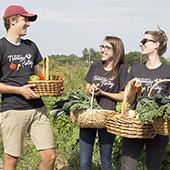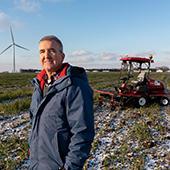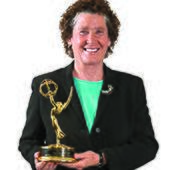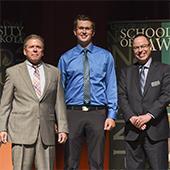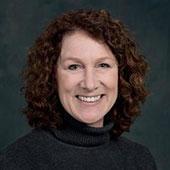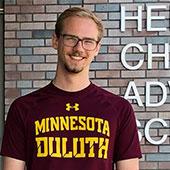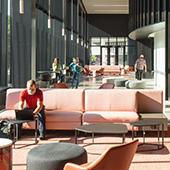Notice: Brief will not publish on Aug. 26. Weekly publication resumes Sept. 2.
- Features: The pantry in a time of pandemic; Mower with a mind of its own; Leveling the field.
- People: The Center for Transportation Studies has secured funding to create an ecosystem for the study of connected and automated vehicles; and more.
The pantry in a time of pandemic
On the Twin Cities campus in St. Paul, the oversized garden that helps supply fresh vegetables for the Nutritious U food pantry is lush and healthy, according to Rebecca Leighton, the health promotion specialist who brought the idea for a pantry to life three years ago. This year the garden will come in especially handy, as Leighton point outs that college students are suffering from the food insecurity issues laid bare by the COVID-19 pandemic.
Mower with a mind of its own
About 250 crossbred Holsteins graze on grasses and cover crops at the West Central Research and Outreach Center (WCROC) near Morris, MN. But the cows don’t eat everything, and the weeds left behind will spread unless cut. That’s when the cowbot goes to work. The mission of the cowbot is to explore a new way to reduce agriculture’s carbon footprint—a priority at donor-supported WCROC, which is committed to using renewable energy to reduce fossil-fuel consumption in agriculture.
Leveling the field
In July 2019, millions of TV viewers watched the U.S. women’s national soccer team win the World Cup title. These ratings validated what Professor Mary Jo Kane has studied for decades: people want to watch women’s sports if players are characterized as skilled athletes instead of sex objects. Kane is director emerita of the U of M’s Tucker Center for Research on Girls & Women in Sport, which she founded in 1993. She recently committed an estate gift to establish the David and Janie Kane Endowed Tucker Center Director Fund, which honors her late siblings.
People
The Center for Transportation Studies has secured funding to create an ecosystem for the study of connected and automated vehicles; fifteen students and alumni have been offered Fulbright Awards to teach and conduct research abroad; Myron Frans has been appointed as senior vice president of finance and operations, pending Board of Regents approval; U in the News features highlights of U faculty and staff cited in the media. People
University of Minnesota opens clinical trial for new treatment of COVID-19
A patient with COVID-19 and lung failure at the University of Minnesota is the first to be treated in the U.S. on a new FDA-approved clinical trial determining the safety and effectiveness of mesenchymal stem cells. This new treatment—for some of the sickest patients with COVID-19—is aimed at halting the intense inflammatory response of the body, referred to as a “cytokine storm.”
First-generation students’ experiences during COVID-19
The COVID-19 pandemic has had negative impacts on first-generation students enrolled at large public research universities, according to a recent Student Experience in the Research University (SERU) Consortium survey of 28,198 undergraduate students. First-generation students were more likely to experience financial hardships and higher rates of mental health disorders, among other findings. U of M SERU researchers Krista Soria, Daniel Jones-White, and Bonnie Horgos will continue publishing more SERU survey results online. See a full copy of the report.
Measuring SARS-CoV-2 infection among a sample of health care workers
A study to screen nearly 500 symptom-free health care workers to see if any were actively infected with COVID-19’s SARS-CoV-2 virus found all participants to be infection-free. The results suggest that the prevalence of active infection at any single point in time is potentially low among health care workers without symptoms.
Balancing family responsibilities and work for faculty and staff
The University is committed to supporting faculty and staff instructors as they continue to advance the research, teaching, and service of the University while fulfilling their personal commitments. In addition to the information for working parents provided by the Office of Human Resources, the Office of the Executive Vice President and Provost has gathered information relevant to faculty and instructors.
Vendor selection for IT solutions
Are you looking to acquire new technology to meet a teaching or administrative need? Faculty or staff who need to engage corporate vendors have resources at the U of M who can help review initial and ongoing vendor partnerships so that collaborations avoid foreseeable risks. Learn how to select a qualified vendor from a University Information Security expert.
Take the Cultivate Inclusion Challenge
Most people who create content that isn't accessible simply aren't aware that they are excluding people from an equitable online experience. To help build Digital Accessibility awareness and skills (and receive prizes) nominate yourself, a colleague, or a team to take the Cultivate Inclusion Challenge.
Research Brief: Black newborns die less when cared for by Black doctors
In the U.S., Black newborns die at three times the rate of white newborns. However, new research from the University of Minnesota finds that Black newborns’ in-hospital death rate is a third lower when Black newborns are cared for by Black physicians rather than white physicians. Additional recent Research Briefs include “Children eat healthier school meals following Healthy, Hunger-Free Kids Act,” “Bee neighborly—sharing bees helps more farmers,” and “COVID-19 hospitalizations analysis shows significant disparities in the disease’s impact across racial and ethnic groups.”
Wellbeing Series for Planetary Health
The relationship between the environment and humanity is one of interdependence—each inextricably affects the other. This fall, the Center for Spirituality and Healing will host a three-part event (Sept. 17, Sept. 30, and Oct. 6) featuring national and local leaders who will not only help us understand the deep connections between planetary health and human wellbeing, but also inspire us to develop personalized plans for taking actions in our daily lives, our homes, and our communities.
U of M featured virtual events
Aug. 24-Sept. 3 - Fall 2020 Teaching Enrichment Series
Aug. 25 - Reducing Inequities: Creating Change in Our Communities
Aug. 31 - People & Planet: Resilient Food Systems
Sept. 11 - White/Black: A Tale of Two Opioid Epidemics
Sept. 17 - 2020 Landscape Arboretum Gala in the Gardens
Sept. 19 - U of M Day of Service
Crookston graduate paves the way to becoming a lawyer
Ethan Johnson looks back at his time at the University of Minnesota Crookston as a vital stepping stone on his path to becoming a lawyer. Johnson, a 2019 graduate, double majored in business management and communication studies.
Helping children starting school
Associate Professor Molly Harney, early childhood education, offers ways that adults can support children who may be apprehensive about starting school in the fall. Harney, whose research includes early brain development and emotional development, stresses the importance of such things as establishing routines, sharing clear expectations, building resilience, and helping kids learn through everyday activities and playtime.
Student creates a new compound
Last month, while conducting research for UMD professor Viktor Zhdankin, chemistry major Gunnar Frahm created a new carbon-carbon bond compound. Frahm had been testing the reactions of iodine compounds and was expecting a carbon-nitrogen bond formation. After running the experiment multiple times, and getting the same results, Frahm recalls, "I was in disbelief.”
Cookbook highlights food of Great Lakes Indigenous peoples
Students Derek Nicholas and Grace Miller collaborated on a new cookbook that combines recipes, language, and the history of the Anishinaabeg. The project is featured in a recent story by Great Lakes Echo.
Aug. 20 - ‘We Are Water MN’ exhibit opening
“We Are Water MN” opens at U of M Morris on Aug. 20. This traveling exhibit examines water issues statewide and in local communities through personal stories, histories, and scientific information. The exhibit is on display in the Edward J. and Helen Jane Morrison Gallery through Oct. 19.
Chancellor Carrell featured in Georgetown University webinar series
Representing the innovative Rochester campus, Chancellor Lori Carrell was a featured speaker in the Georgetown University webinar series “Higher Education’s Big Rethink: COVID-19 and the Future of Learning, Equity and Transformation.” The webinar series is a multi-layered community learning event that follows and interprets the story of higher education’s adaptation to the challenges of the COVID crisis, as well as the national consciousness around racial justice. Learn more and watch videos of these interviews with higher education leaders.
Advancing the Mapping Prejudice project
After exposing structural racism in Hennepin County, the Mapping Prejudice project at the University of Minnesota Libraries has received new funding to develop its digital tools so they can be used by communities across the country. With a $324,478 grant from the National Endowment for the Humanities, project leaders will be able to refine the suite of digital tools that they developed for mapping racial covenants and to expand and redesign the website.
Monitoring system provides decade of data from I-35W bridge
On Aug. 1, 2007, the I-35W bridge collapsed in Minneapolis. Its replacement, open to traffic just over a year later, was instrumented with more than 500 sensors to record the new structure’s behavior and evaluate the effectiveness of different monitoring strategies. A 10-year review of the bridge’s monitoring system is now available from U of M researchers. The continuous operation of the system makes it one of the longest-lived in the country.
Health Sciences Education Center heralds a new beginning
The new Health Sciences Education Center (HSEC) signals a transformation in health sciences education and brings together all of the health sciences schools and affiliated programs at the University of Minnesota. With an emphasis on interprofessional collaboration and training based on real-life scenarios, HSEC will prepare the health professionals of the future.
Community-University Health Care Center steps up during COVID-19
In honor of National Health Center Week, Roli Dwivedi, Department of Family Medicine and Community Health, and fourth-year medical student Alycia Chmielewski, talk about their experience teaching, learning, and caring for patients during the COVID-19 pandemic at the Community-University Health Care Center.
Department of Radiation Oncology enters year 50
Kathryn Dusenbery, professor and head of the Department of Radiation Oncology, shares the department’s major milestones from the last 50 years and how the department continues to study, teach, and provide therapeutic solutions for patients with cancer.
